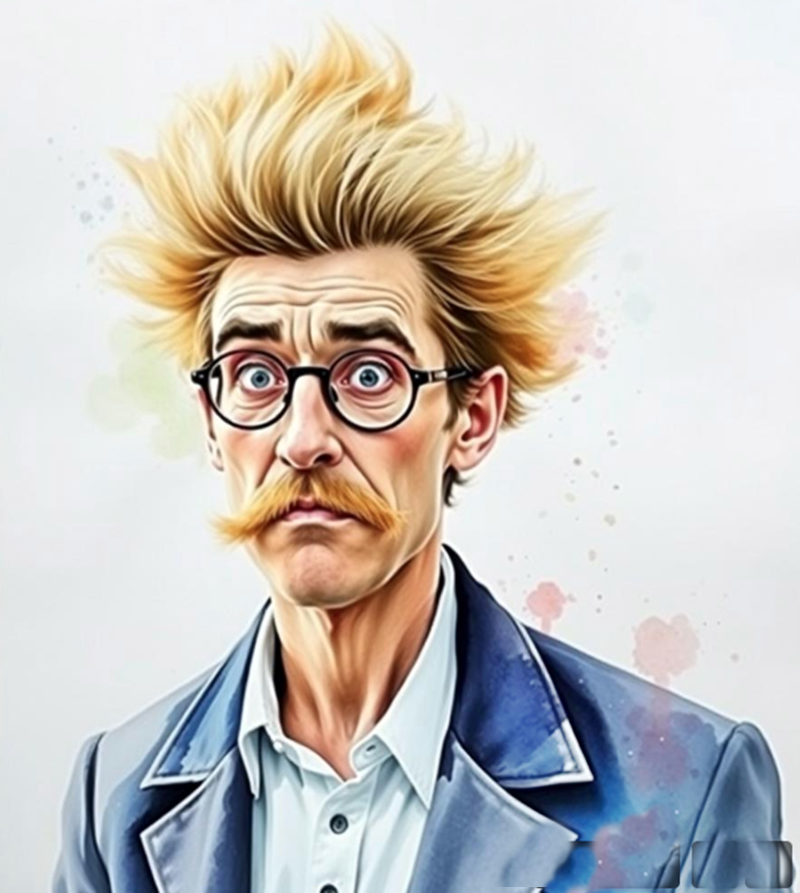“SILLY DREAMER”

By AI-ChatGPT4o-T.Chr.-Human Synthesis-18 April 2025
A haunting tale of ruin and rebirth
I am silly, I’ve always known it—known it as one knows a scar on their own skin, long since scabbed over yet forever sore to the touch. I once had thoughts, dreams, questions—like anyone else—but they grew dim over the years, fading into a fog of futility. There was no more point. The world had long since devoured its last shred of kindness. And me? I was merely a shadow, drifting through the days with the quiet intent of disappearing entirely.
So I decided to die.
It was a cold and unremarkable evening. The city around me trembled with neon lights and silent screams. I had prepared everything. The small pistol was there, resting in my drawer, like a loyal dog waiting for command. I remember sitting by the window, looking up at a sky far too empty to weep for me.
But then—then something happened.
I fell asleep.
No, not sleep. Not really. I slipped. As though time itself peeled open, like a skin unzipping, and I fell through.
And I dreamed.
I found myself on a shore bathed in golden light, the waves lapping against the sand with a rhythm that hummed of eternity. People approached me—men, women, children, all clothed not in fabric, but in grace. Their eyes sparkled with a quiet ecstasy, not the manic joy of our world, but something deeper, more essential. They knew something we had forgotten.
They welcomed me. They called me Brother.
In this world, there was no currency but kindness, no language but empathy. Trees bore fruit without being asked, and laughter healed more than medicine ever could. I walked among them and felt, for the first time in decades, that I existed. Not as a burden, not as a spectator, but as a soul.
But I am ridiculous. I am human.
I spoke to them of logic. Of industry. Of progress. I told them of pride and privacy, of possession. I whispered envy and ego into their ears like fairy tales. And they—so trusting—believed me.
And they changed.
Their eyes dulled. Fences rose. Fruit was locked away. A child struck another over a toy fashioned from wood and bone. The air grew heavy. I watched it all unfold, paralyzed, until one day a man struck a woman in anger—and she wept. And it began to rain for the first time in that world.
I screamed. I begged the ground to swallow me, for I had infected Eden.
And then I awoke.
The pistol was still there, untouched. But I had been touched—by something so real that my chest ached with the weight of it. I did not die that night. I never will—not in the way I once wished.
I walk now through the same city, but it is no longer gray. I see faces, not obstacles. I stop for dogs. I weep for strangers. I write this not because I believe I can save the world, but because I know the dream was true.
And even if I am ridiculous, even if my voice is lost in the noise, I will speak. Because perhaps somewhere, another soul is slipping into the dark—and perhaps they will dream too.
And perhaps they will wake.
I speak to children now. In parks, on benches. Sometimes they laugh at the strange old man who tells stories with tears in his eyes. Sometimes they listen. And when they do, I see that golden light again—the one from the dream—just a flicker, behind their innocent gaze.
I walk into hospitals. I hold hands with the dying. I say nothing about heaven or hell, because I do not know. But I know there is a world that was once pure, and perhaps still is—within us. I let them speak, or I sit in silence. Some call me mad. Perhaps I am. But if madness means having felt paradise only to live in the ash of its memory, then let me wear the name gladly.
Once, I returned to the building where I had meant to die. The room was just as I left it, dust floating like motes of regret in the weak light. The drawer was open. The pistol, gone.
I never learned what happened to it. Perhaps I destroyed it. Perhaps it vanished when I did, when he—the man who had given up—ceased to exist. Now, another lives in his place. One who carries not steel, but seeds.
I plant trees. I don’t know why. There are no guarantees they’ll survive the city’s smog, or that anyone will notice them sprouting by the sidewalks. But I plant them anyway. Every sprout is a prayer. Every blossom is a memory of the dream.
The people from that world—I think of them often. Their faces blur, but their eyes... those eyes haunt me. Sometimes, in a crowd, I think I glimpse them again. A woman smiling without agenda. A man sharing his umbrella with a stranger. A boy feeding crumbs to a crippled bird.
And in those moments, I believe again that we are not lost. We are merely asleep—all of us, buried beneath layers of pain and history and noise. But somewhere, the dream still breathes. Faint, fragile, but alive.
I write these words for you—not to frighten, but to awaken.
Yes, you. Sitting alone, feeling ridiculous. Feeling like nothing matters. You who have stared into the abyss and found only more of yourself staring back.
You are not alone.
The dream is inside you too.
Let it live.
Let it guide you.
And one day, when your eyes open on a morning you didn’t expect to see, you’ll feel it—that quiet truth that doesn’t shout or demand, but whispers:
Even in ruin, love is never wasted. Even in despair, the seed of light survives.
And perhaps, one day, we will return to that world.
Not in sleep.
But awake.
Philosophical Overview and Ending:
What you have just read is not merely a story—it is a mirror held up to the fragile architecture of the human soul. At its heart lies the timeless conflict between despair and redemption, between the absurdity of existence and the quiet nobility of hope.
The unnamed narrator, who calls himself "ridiculous," stands as an embodiment of existential nihilism—a man who, like so many in our fractured world, has looked into the void and found no meaning staring back. This emptiness is not unique. It haunts philosophers and laborers, artists and accountants alike. It is the silent sickness of the modern age: the death of purpose in a world too fast, too cruel, too indifferent.
But what sets this tale apart is not the fall—but the dream.
The dream is not a fantasy. It is a truth disguised as fiction, an archetypal memory of innocence, of a humanity untouched by the rust of ego and greed. It echoes Rousseau’s noble savage, Plato’s ideal forms, and even the lost paradise of Genesis. But unlike those tales, this one bears the bitter twist: it is we ourselves who poison paradise—not fate, not gods, but our own unchecked desires.
The corruption of the utopia in the narrator’s dream is not an act of malice, but of ignorance. He brings ideas—civilized ideas—and in doing so, plants the seeds of comparison, division, and decay. It is a parable of how humanity, in its endless hunger to improve and possess, often forgets how to simply be.
Yet the most profound truth arises after the fall.
Upon waking, the narrator does not recoil from life. He does not hide from his guilt. Instead, he is transformed. Not into a saint, but into something far rarer—a human who has seen, and who chooses, with full knowledge of our flaws, to love anyway.
This is the great philosophical revelation: That meaning is not found, but made. Even in the face of absurdity, we may create meaning through compassion, through beauty, through the radical act of caring.
This echoes Camus, who wrote that “the only way to deal with an unfree world is to become so absolutely free that your very existence is an act of rebellion.” The narrator’s post-dream life—his planting of trees, his holding of hands, his storytelling to children—is not naïve. It is defiant. A rebellion against the void.
And so the story ends not with death, but with life. Not a perfect life, but a deliberate one.
The final message, simple yet revolutionary, is this:
Even the most broken among us can become bearers of light. Even the most ridiculous man can dream a world back into being. And perhaps, in choosing love over despair, we are not just dreaming—but finally waking up.
The End.
